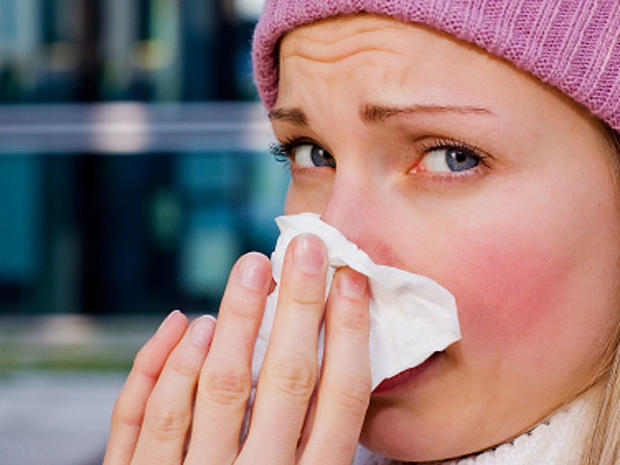9 Ways to Stay Sniffle-Free
"There are no guarantees, but you can seriously lower your odds of illness by taking simple precautions to avoid germs and keep your immune system humming," says Dr. Sandra Fryhofer, clinical associate professor of medicine at Emory University School of Medicine.
Use this checklist to stay healthy through cold-and-flu season and beyond.
MORE FROM HEALTH.COM: 5 Myths about the Common Cold
Say Yes to the Flu Shot
"There's a greater realization that we all interact with each other, so the best way to reduce the spread of flu is to vaccinate everyone," says Dr. Susan Rehm, medical director of the National Foundation for Infectious Diseases.
MORE FROM HEALTH.COM: 5 Myths about the Common Cold
When to Get Your Flu Shot
You can opt for an injection or (if you're healthy and not pregnant) the FluMist nasal spray. Get a new flu shot every year because you lose immunity over time and because the viruses targeted by the vaccine usually change from year to year.
This year's formulation will also protect against H1N1 (a.k.a. swine flu), so there's no need for a separate shot.
MORE FROM HEALTH.COM: 5 Myths about the Common Cold
Eat to Beat Illness
Essential power players include high-quality protein, such as fish, lean meats, and beans, needed to help build white blood cells (the body's defenders); brightly colored fruits and veggies, which provide immune-boosting antioxidants; and omega-3 fatty acids (good sources include fatty fish, walnuts, and flaxseed) to keep the immune system balanced.
MORE FROM HEALTH.COM: 5 Myths about the Common Cold
Keep Moving
A University of South Carolina study found that people who walked or did other moderate activity for 30 minutes most days averaged one cold per year, while less-active folks reported more than four colds per year.
Just don't overdo it: Heavy exertion--like marathon training--may increase your risk of catching seasonal bugs, perhaps because it can stress the body's systems, allowing viruses to gain a foothold.
MORE FROM HEALTH.COM: 5 Myths about the Common Cold
Hydrate Inside and Out
If you're going to be in a superdry environment like an airplane cabin, protect yourself by using a saline nasal spray to moisten the membranes in your nose. "When nasal passages are hydrated, the cilia, hair-like structures lining the nose, do a better job of keeping bacteria and viruses out," Dr. Fryhofer says. Drink plenty of water, too: Your body needs H2O to execute many key immune functions, Dr. Katz says.
MORE FROM HEALTH.COM: 5 Myths about the Common Cold
Befriend Bacteria
Probiotics are friendly microbes that may strengthen the immune system by crowding out bad germs that make us sick. A German study found that healthy men and women who took probiotics daily for three months shortened bouts of the common cold by almost two days and reported reduced severity of symptoms, such as headaches, coughing, and sneezing.
Aim for three servings a day of probiotic-rich foods--yogurt with live bacteria, aged cheese, kefir, or other fermented foods (like sauerkraut or kimchi), says Dr. Gary Huffnagle, a professor of internal medicine at the University of Michigan Medical School and author of "The Probiotics Revolution."
If you prefer a supplement, Huffnagle recommends choosing one with 3 billion to 5 billion CFU (colony-forming units).
MORE FROM HEALTH.COM: 5 Myths about the Common Cold
Sleep on It
MORE FROM HEALTH.COM: 5 Myths about the Common Cold
Give Germs the Slip
Soap up long enough to sing "Happy Birthday" twice through (about 20 seconds); if you can't wash, use an alcohol-based hand sanitizer.
Be sure to scrub or sanitize after touching the germiest surfaces - doorknobs, fridge handles, TV remotes, bathroom faucets, and money - and after shaking hands. Keep your mitts off your face, to avoid giving germs a free ride into your eyes, nose, or mouth.
MORE FROM HEALTH.COM: 5 Myths about the Common Cold
Dodge Germs in the Air
And do your part to prevent the spread of germs: If you do get sick, sneeze into your sleeve, toss tissues immediately, and - if possible - stay home until you're better.
MORE FROM HEALTH.COM: 5 Myths about the Common Cold









